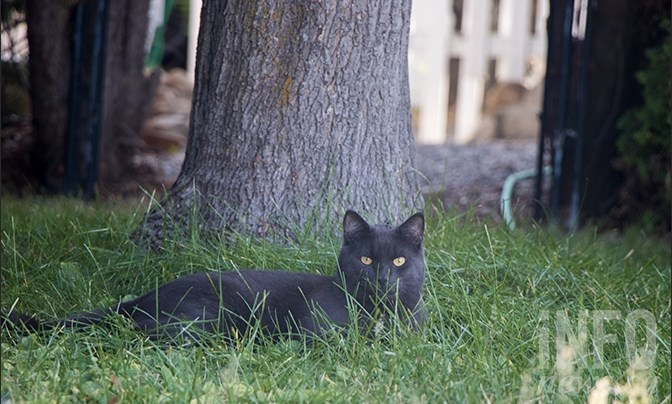
FILE PHOTO.
(SHELBY THEVENOT / iNFOnews.ca)
December 03, 2019 - 5:30 PM
If you’ve noticed feral cat colonies in your area, here’s what you can do to help during this winter season.
Kamloops is one of three areas in B.C. currently identified as having a cat overpopulation crisis and the local SPCA is working on a solution to get the community involved to help the stray cats living on the streets this winter.
Recently, the Kamloops and District B.C. SPCA held two workshops for anyone interested in building shelters for their community cats, according to Regional Humane Educator for the Kamloops and district B.C. SPCA, Deirdre Campbell, which she hopes will spread to other shelters across the region.
The shelters are made out recyclable materials: a plastic tote at least 60 litres in size, straw and a styrofoam cooler. At the first workshop more than 40 people showed up to make 20 outdoor shelters and have been deployed in various neighbourhoods where cat colonies exist in Kamloops.
“We provide the materials, it’s a free event and we teach people a bit about these cats and the hazards they are facing and then we work together to create these outdoor shelters so there is one less hazard they have to worry about during the winter time,” Campbell says.
Once they are in neighbourhoods, the goal is to have people care for those specific shelters by making sure cats are using them and if they notice the cats need attention to give the SPCA a call.
Currently, the areas within the city that have been identified as having cat colonies include the Mount Paul Industrial Park, North Shore, Barnhartvale and several communities north of Kamloops including Vavenby, Barriere, and Clearwater.
“The smaller communities that don’t have the SPCA building right there to help them… are struggling a lot because they are having to bring their cats here into the shelters in Kamloops because we are serving those areas as well,” Campbell says.
As to why these areas are experiencing a cat overpopulation problem, Campbell says there are two main reasons.
“Largely the issue is that there are resources for cats in these areas,” she says. “Those resources might be environmental or there might be somebody there who is taking care of these animals.”
People might see these cats and be in a situation where they are unable to care for their cat and think it’s better to release them to the outdoors, she says.
“Maybe they don’t want to surrender it to a shelter due to the negative implications of that or whatever reason and they see these other cats living outside and they go ‘that’s such a wonderful life, I could let my cat be outdoors and live with all these other cats’ but unfortunately it’s just adding to the population,” Campbell says.
The SPCA is also trying to deal with the overpopulation through trap, neuter and return programs, Campbell says.
“Research has shown if you relocate them another animal will move in as long as resources are there so the best way we found to deal with the population issues is going in and spaying and neutering cats and taking the kittens if we can get them young enough we can socialize them and get them homes,” she says.
But if people who have outdoor cats aren’t spaying and neutering their pets, the program won’t work.
“These cats are coming into the colonies and adding to the colonies and then going home at the end of the day. It’s just a continuous cycle of overpopulation due to this spay and neuter issue,” Campbell says.
Currently, there are no active trap, neuter and return programs but when they work in tandem with the rest of the population who are neutering their outdoor pets, it’s been proven to be an effective solution.
As for the outdoor shelters for cats, anyone interested in volunteering or finding out more information, they can send an email to kamloopscats@spca.bc.ca.
To contact a reporter for this story, email Karen Edwards or call (250) 819-3723 or email the editor. You can also submit photos, videos or news tips to the newsroom and be entered to win a monthly prize draw.
We welcome your comments and opinions on our stories but play nice. We won't censor or delete comments unless they contain off-topic statements or links, unnecessary vulgarity, false facts, spam or obviously fake profiles. If you have any concerns about what you see in comments, email the editor in the link above.
News from © iNFOnews, 2019